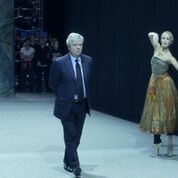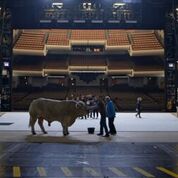Does one really need to see Swiss filmmaker Jean-Stéphane Bron’s “The Paris Opera?” It’s opening in L.A. at the Laemmle theaters this weekend. You can already imagine it, right: Venerable themes of youth and beauty and lonely artistic labor, as expressed by the bulging calf muscle and pointed toes of the student at the ballet barre? Or the isolated opera diva in makeup and hair net summoning strength before her dressing room mirror? Tight expressionistic details will come swooning forward while the epic music pounds, and then, when the director cuts to the stage production we’ll all be ignited with newfound appreciation for the art and the performer. Or maybe — often — not. Maybe we’ll feel more like dull, unappreciative dunderheads than ever.
Thankfully, wonderfully, Bron’s “The Paris Opera” crackles with its own inner curiosity and constraints and skepticism; its dense vision of theater’s economic and interpersonal challenges shatters all those tired conventions. Previously focused on political issues — his “Cleveland Versus Wall Street” debuted at Cannes — Bron’s new production follows the Paris institution through the truly tumultuous 2015-2016 season. Art is rarely discussed, but money is.There is no voice-over, no use of talking-head interviews, and no recorded performances are shown unless the presentation is being witnessed by one of the film’s protagonists. Lots of arrangements are made. Crises descend, one after another, and yet there is still ample time to follow the progress of young orchestra students or to trail the long hallways behind the clip-clopping steps of a habilleur.
Though “The Paris Opera” plays with notions born from the two major artistic disciplines here — ballet’s non-narrative journey and opera’s structural tableaux — Bron admits the world of opera and dance was barely known to him before he began the project. Speaking by phone this week from New York, Bron describes how lucky he felt to find another greenhorn, Mikhail Tymoshenko, the young small-town Russian opera singer featured in the film. “I was really looking for this guy,” he says. “I was looking for a character I could identify myself with. He came from another world, he doesn’t speak the language, I don’t speak the language of the opera, he has everything to discover, so I can really identify myself with him.”
“The Paris Opera” also served as a way for Bron to combat a depression that settled upon him after his last film, “The Blocher Experience,” in which he followed the billionaire rightwing nationalist Christoph Blocher on the campaign trail in Switzerland. The film caused “a lot of controversy” in Switzerland and then in France, Bron says, plus “It was not so easy to spend three years of my life with him, I was very much depressed.”
He wanted to embark on a project with “a lot of characters, inside a collective, people working together,” but he didn’t have a specific place. His producer told him “something is going to happen at the Opera House, there is a new [general] director [Stéphane Lissner], new director for the dance [Benjamin Millepied], new director for the chorus [Philippe Jordan], plus a new government in the country [under President Hollande]. He said: ‘It’s going to be difficult for the director, he’s going to be tested.’”
“I was looking for difficulties,” he says. “And I wanted to bring in everything that is on stage and everyone that is backstage. To say that we should cherish what brings us together even if it’s difficult to live together — that’s the idea of filming a society. To cherish what lifts up our collective mind and spirit.”
DRAMA IN PARIS
Besides the innate tension of the set up — a new artistic crew mounting 9 new operas and 8 new ballets under intense scrutiny — Bron stumbled into a cavalcade of incidental drama including a threatened chorus strike, deep financial cutbacks demanded by the Ministry, the sudden illness of a lead singer, and the shocking resignation of dance star Benjamin Millepied less than a year into his tenure. Most significant — to the film’s tone and the community itself — were the November terrorist attacks that included the death of 90 concertgoers at the Bataclan theater. “There had been a kind of distance at the beginning of the shooting,” Bron explains, “I had a kind of distance. But from that point I was really part of the society.”
That shift is also reflected in the film’s camerawork, particularly around the stage action. Initially he’d been shooting from the wings of the stage, squeezed into an 8-foot square with oblique sightlines. After November, one of the three fixed lens moved closer to the performers (he never uses zoom); concurrently, the vocalists seem to be reaching new highs and lows. To sing opera, he says, “you have to be completely inside what you are doing, you cannot control it from the outside. It’s like another state of consciousness.”
Bron’s understanding of the audience’s needs and experience also evolved. While he came to see the opening production of the season — Romeo Castellucci’s premiere production of “Moses and Aaron” — as a true masterpiece, he also knew how ludicrous the outrageous costumes and design would appear if he didn’t set them up properly. “If you have just a few seconds of the show you can reject it. It’s almost impossible to step into it,” he says. To orient audiences, Bron latched onto the travails of the giant Charolais bull (and his handler) who appear onstage for long stretches of the opera. To acclimate the animal, the handler blasted Schoenberg’s scratchy, squawking notes into the bull’s outdoor pen for 12 months straight. It’s quite a sight: Trees tower above, the bull stares ahead impassively, and the score bleats and squeals in all directions. “The idea is if you see through the eyes of the training of the bull it’s like you have this emotional way in,” Bron says. “You can maybe catch something from the show instead of being rejected by the show.”
MILLEPIED’S DIFFICULT WORDS
For Bron, the relevant aspect of the drama surrounding both the arrival and then the sudden resignation of international danseur/choreographer Benjamin Millepied was the media energy it brought into the theater halls. “I knew from the beginning that I would not treat him in the film as a star,” Bron says. “He was part of the society.” Since Millepied was besieged by press during his first few months in the building, Bron waited until early 2016 to get into the studio with him. And by then, he says, “something was off.” There are some close shots of Millepied in sweats and a Hendrix t-shirt rehearsing some of the loose, flying partnering work in “La Nuit S’Achève” (The Night Ends), and he’s also captured at the front of the room, a million miles gone as he taps out a message on his cell phone. The haunting melodies of Beethoven’s “Appassionata” sonata, which he used for his final piece, float in the background as the news suddenly erupts about his departure decision. Over 200 journalists crowd the theater lobby, yelling questions. “What really happened?” “Why so sudden?”
Journalists surmised mutual discomfort between the two entities: one large and hierarchical, the other young and impatient. The film presents no verdict, and nor will Bron, but he’s happy to share his orientation to the story. “I heard… I had the feeling that he was not so happy. And so I knew that something possibly could happen. I don’t know exactly — I’m not a journalist, I was not so much interested in what really happened, because I think it’s hard to say, it was many different things probably. What I was really interested in was how in 2 days, not in two days, in 24 hours, you can have 200 media in the building. It was so big the fact that he decided to quit. It says something about what is an opera house. Irrational passions, irrational emotions, for me it was most important to show him saying goodbye to his company. ….I think for him it was not an easy decision. It was very difficult.”
During the shooting, he says, “I knew that it was a big story but I knew also that I didn’t want to go too much inside it because I want that you can see the film in 10 years or 20 years and you can understand that something happened, but it’s not the most important thing.”
Though Bron admits he’s now back to working on political fare — next up is a documentary on artificial intelligence — this was not just a healing sojourn, but a true artistic education. “I listen to music differently now,” he says, and “my approach with music is quite different.”
Los Angeles Area Theatrical Dates
10/20: Laemmle Royal – West LA CA
10/20: Laemmle Town Center – Encino CA
10/20: Laemmle Playhouse – Pasadena CA
10/27: Palm Desert 10 – CA
THE PARIS OPERA (2016)
Directed by: Jean-Stéphane Bron (The Blocher Experience, Cleveland Versus Wall Street)
Featuring: Benjamin Millepied, Stéphane Lissner, Philippe Jordan, Bryn Terfel,
Olga Peretyatko-Mariotti, Gerald Finley
RT: 110 minutes
Aspect Ratio/Audio: 1.85:1/5.1 Surround Sound
Language: French with English Subtitles
Genre: Documentary
[Exclusive film clip and stills courtesy of Film Movement]

